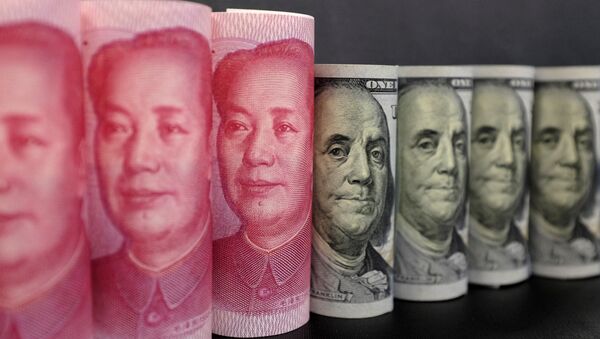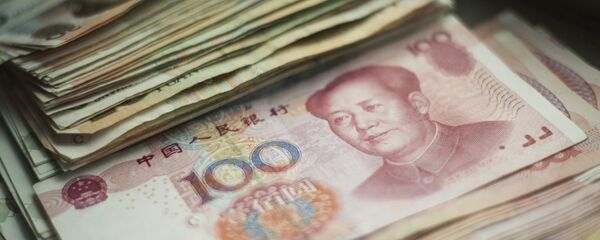Sputnik: It's challenging the global dominance of the US dollar, it's something that China might be able to achieve in the long run, is that your take on it or what's your point of view?
Tom Luongo: The launching of this oil futures contract is very important but it's not earth shattering in the near term. The goal here is for China to open up the yuan trade and in order to deepen the yuan liquidity worldwide and for them to begin the process of creating an investable government and corporate, yuan-dominated market known as the dim sum bond market and that's really the goal here in the long run because that's how they're going to truly take over a part of the global oil trade, just global trade in general, using their currency. Being the world's largest importer of oil they are the marginal buyer of oil and therefore they will eventually have the ability, like we did, the United States had in the 70's, to say you're going to accept our currency for your oil, that what they said, that was the deal that we made with the Saudi's and the Saudi's took it.
READ MORE: Why Petro-Yuan May Become Win-Win Solution for US, China
Sputnik: Just try to explain to us in layman terms, for the average intellectual person in the global audience, why is it that the US dollar has got this God-given underwritten rule that all transactions have to be carried out in US dollars? How has that actually been historically implemented and why it is so difficult to override it, I think that's what the average person wants to understand, the people who are not in the oil or the trading industries fail to understand or can't quite grasp, can you just explain why that is?
Tom Luongo: It's a mixture of confidence in the United States' ability to make good on their debts, we've never defaulted on our bonds, so that's a big thing, confidence is the most important part, and after that it gets backed-up by US political and military pressure around the world. Gaddafi and Saddam Hussein were made examples of for trying to get off the petro-dollar system, and China, unlike those two, has a lot more power in the marketplace and the United States can't play the same game, we can't just go in and regime change China because they decided to stop spending dollars to buy oil, you'll notice that we've been trying very hard in many ways to regime change Russia for de-dollarizing its oil industry.
Sputnik: Could this be the initiation, the start of the US losing it's global dominance in the banking of the global oil industry, losing its control and that's imperialism, could this be the start of it?
Tom Luongo: It's the start of a very long process because markets are dominated by institutional investors who are risk-averse in every sense of that word, they are the most conservative of investors and they are the most conservative of money managers and for that reason until the United States abdicates its contracts with the dollar, until it defaults on a bond or something like that happens, the process is going to be slow, it's important to understand that this process will be slow, you have to think of that China here is thinking about 20 years down the line, they're thinking about 2035, they're thinking about 2040. What's the world going to look like then? They're also along with the Russians playing a game of attrition against the US and European banking system which are very fragile in many ways, so the game that both countries are playing is the right one, which is to look to the horizon, look to the future, build foundations of a new monitoring system and then allow the markets to come to them, they just can't dictate to the market what the market is going to do.
READ MORE: Trump Tweets 'No Trade War With China' as Beijing Braces for Economic Showdown
Sputnik: So you're basically saying it could probably take 20-30 years, a generation really…
Tom Luongo: Maybe not that long, I would be prepared on that time frame I wouldn't say it's going to be 18 months, let's put it that way, I think that 20-30 time frame is looking very interesting, the United States has got a lot of internal divisions and pressure is building up within it and contradictions that need to be resolved.
Don't get me wrong, I'm not downplaying the yuan, I think it's very important, it's an incredibly bold move by the Chinese and it is well-timed, it's perfectly well-timed. There's many opportunities for a lot of other players to get off of the system and the current petro-dollar system changeover over 5 or 10 percent of the marginal oil trade into yuan, that's a big deal and that's going to have a depressing affect on US and European financial markets whose credit and institutional leverage is going to be deflated by the loss of these trade dollars.
Sputnik: Is there anything the United States can do to offset this, because ultimately they want to keep control, that's the trend, isn't it?
Tom Luongo: What they can do, they can tell the Democrats to shut up and act rational. I published an article yesterday about it on my blog talking about this: "Is Putin Winning the War of Attrition Against the US?" And in it I talked about how the idea of Triffin's Paradox, which I know it's not a layman's term, the United States is running both a budget deficit and a trade deficit. To be the world's reserve currency it has to run a trade deficit, in order to liquify world trade it has to export dollars and import goods. Fine. If the US wants to keep that dominance they're going to have to deal with trade deficit, eventually that imbalance overtime will cause serious problems.
The views expressed by the speaker do not necessarily reflect those of Sputnik.




